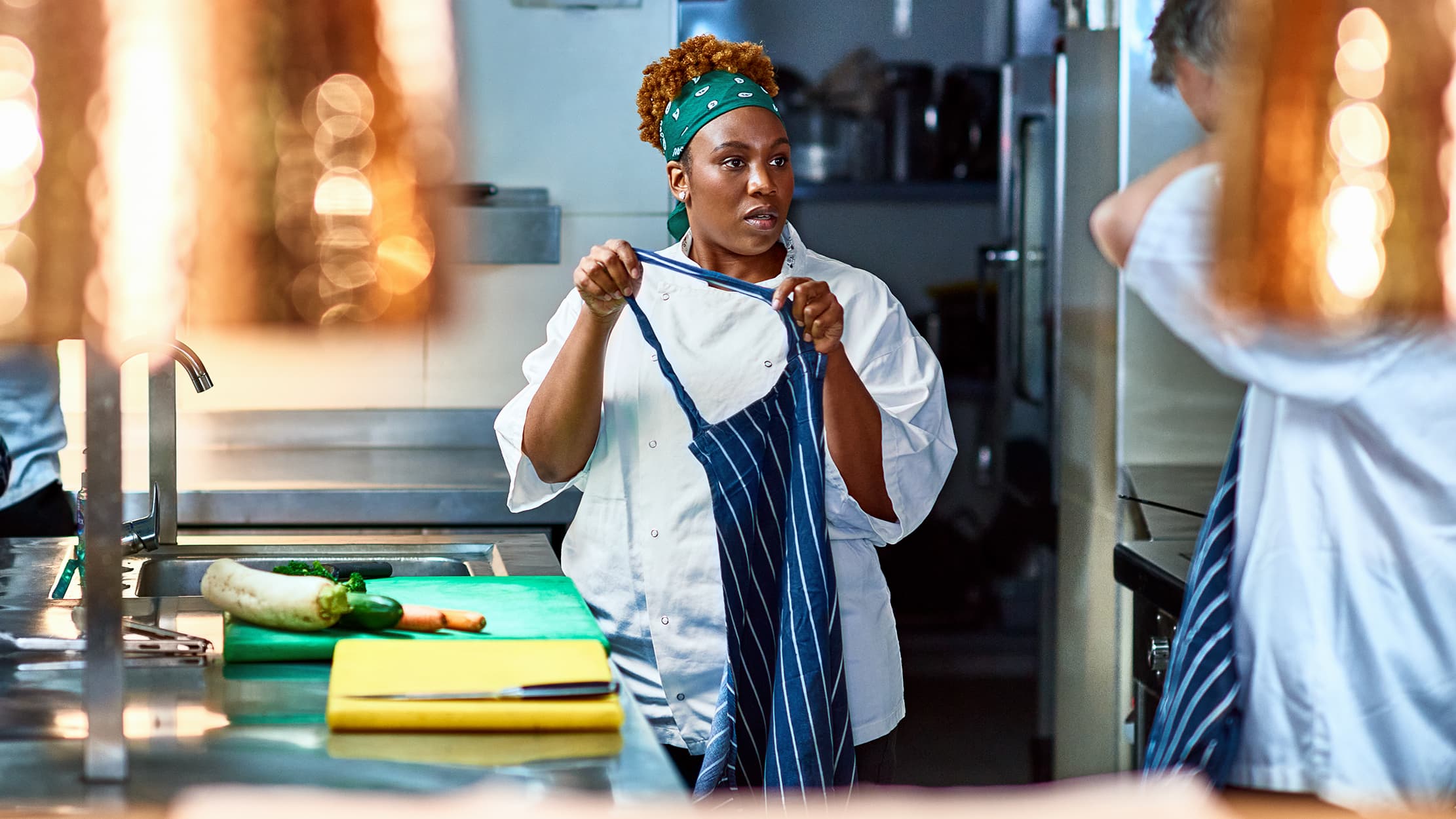You’ve got an enterprising mind and passion for food. Perhaps you’re thinking about turning your talent into a business, but first there are important questions to answer and numbers to crunch.
So, how much does it cost to open a restaurant?
Whether it’s a small takeaway place or a high-end eatery, you’ll want to make sure you have a firm grasp of what to expect, in terms of your restaurant startup costs.
Here’s what we’ll cover:
How much does it cost to start a restaurant?
The amounts you’re looking at will of course vary significantly depending on the location, type of food business, and how you set it up.
The average restaurant startup cost tends to range from £150,000 to well over £1m.
Our restaurant startup cost checklist breaks down all the expenses you’ll need to consider to make your dream a reality.
Breaking down the cost to open a restaurant
Opening a restaurant comes with its own specific set of cost considerations.
The average restaurant startup and operating costs, plus associated expenses, will also vary depending on size, location and a range of other choices you make.
For instance, the cost of opening and running a sandwich shop or pop-up restaurant will be much lower than the cost involved in opening a fine dining 200-seater in an upscale neighbourhood.
Some owners have tested their concept as a pop-up before opening a full-fledged restaurant.
The overall restaurant startup cost could be anywhere from around £70,000 to £200,000—but it could also go into the millions if you’re looking to open a high-end establishment in a sought-after area.
Regardless of the type of business you want to launch, it’s helpful to break down your restaurant startup costs into two categories: one-time costs and recurring costs.
One-time restaurant startup costs
One-time, fixed costs to open a restaurant are exactly what they sound like—the things you only have to spend money on once.
Keep in mind that some of these are true one-time restaurant startup costs (e.g. the security deposit on the building), while others (e.g. kitchen and cooking equipment, tableware and linens) may need to be replaced down the line due to wear and tear.
Property deposit
This cost varies a lot depending on the size and location of your restaurant.
You can expect to cover a deposit of 25%-40% of the property value if you’re buying the restaurant space, or 3-6 times the monthly rent if you’re leasing it.
Premise licence
You’ll need a food licence, which is free to register for. But if you plan to provide entertainment, serve alcohol, or serve hot food and drinks between 11pm and 5am, a premise licence will be required.
The cost to apply for this ranges from around £100 to £2,000, depending on the fee band of your venue, and there may also be an annual charge.
If you plan to serve food outdoors (on public land), you’ll may also need “street trading consent”, which many councils charge for.
Legal fees
There’s a lot of paperwork and even more legalities involved in a business set-up. You’ll most likely need help from an experienced lawyer to make sure your operation is legal.
For a smaller law firm or solo practitioner, you can typically expect to pay £100-£300 per hour, depending on the lawyer’s experience and the complexity of the work.
The average hourly rate for top UK law firm is around £450.
Building refurbishments
You may need to factor in refurbishment costs to get your space set up. As with all of these figures, the costs will vary greatly depending on your venue, location, and circumstances.
But as a rough guide, you might pay £75,000-£150,000 for a small cafe or wine bar started from scratch with new equipment (20-50 covers); £150,000-£750,000 for a small restaurant with an existing kitchen (50-70 covers); £300,000 to around £1m for a medium-sized restaurant (70-150 covers) with a new rear building extension; and £500,000-£2.5m for a large restaurant and function area (300 users).
Note that you are also duty-bound by the Equality Act 2010 to take reasonable steps to make your venue accessible to disabled people.
Kitchen and cooking equipment
The cost of setting up a commercial kitchen will typically range from around £30,000 to around £150,000.
In addition to your cooking equipment (ovens, cooking ranges, industrial mixers etc.), you’ll need sinks, workstations, proper refrigeration, a commercial dishwasher etc.
One money-saving option is to look for good quality, second-hand equipment. Restaurants that have recently gone out of business may be looking to sell their wares online to recover costs.
Tables, furniture, and tableware
This cost will vary based on the quantity you need and the quality you opt for. However, on average you can expect to spend £15,000-£35,000 on tables, chairs, decorations, etc.
Point of Sale (POS) systems
You’ll need a way to be paid and keep track of orders and inventory. That’s where a POS system comes in handy.
In terms of the hardware, you can expect to pay around £20-£200 per handheld card reader, and £250 to over £1,000 for a countertop terminal or full till system.
Signage and advertising
You’ll want to make a splash with your grand opening. You’re looking at around £2,200 at lower end of the scale, to £50,000 or more if you’re going all out.
Monthly restaurant expenses and ongoing costs
When considering how much it costs to start a restaurant, you also need to factor in a number of monthly expenses and variable or recurring bills.
It’s true that you have to spend money to make money—below are some of the key expenses.
There’s a lot to take in here, but the good news is it can all be managed easily using expense tracking software.
Mortgage or lease
One of the main recurring and ongoing cost to running a restaurant is your monthly lease or mortgage payment.
This will vary based on a number of factors, including location, restaurant size, deposit payment, and the mortgage or lease deal you negotiate—but it’s likely to cost you at least £2,000 – £5,000 per month.
Staff salaries
Unless you’re starting a one-person empire, you’ll need to make sure your business budget includes restaurant staff salaries.
The average base salary for restaurant workers is £12.11 per hour or £24,749 per year. You can expect to pay on average £37,900 per year for your head chef and just over £32,000 for line cooks.
Food and drink costs
This is quite literally your bread and butter, but food and drink costs vary drastically from restaurant to restaurant.
It will depend entirely on what kind of food and drinks you’re serving, as well as the size of your business.
Ways to help minimise these costs could include carrying out regular price comparisons for the items you buy regularly; building and maintaining good relationships with multiple suppliers; and negotiating better prices with new and existing suppliers.
Utilities
You have to keep the lights on and the ovens cooking.
Small restaurants can typically expect to pay around £2,400–£3,700 per year on average for electricity, and medium-sized restaurants around £3,800 – £7,250.
For gas, you’re looking at around £820–£1,500 a year on average for a small business, and about £1,500–£2,250 for a medium-sized business.
Marketing and advertising
For success, you’ll need to have a consistent presence. If you want to go the route of print or broadcasting, ad space is at a premium.
Web advertising is typically less expensive or even free if you take to social media.
Insurance and licencing
Basic public/product liability and employers’ liability coverage for a small restaurant starts from around £500 per year.
But bear in mind that the above figure is the lower end of the scale; it isn’t unusual for restaurant insurance to cost thousands of pounds per year, depending on the coverage needs.
POS software subscription
In addition to the POS system, you’ll need payment management software. You can get a basic pay-as-you-go app for free or spend from £19 to £200+ per month for more sophisticated solutions.
Miscellaneous expenses
These include anything and everything you might not expect. Repairs on equipment or fixtures can get costly, so you should always work the what-ifs into your budget.
Common restaurant startup myths and mistakes
There’s a lot to navigate when calculating restaurant startup costs and strategies—it’s easy to get bogged down by preconceived notions of what is and isn’t necessary.
So, we’ve compiled the most common mistakes new restaurant owners make to help you avoid headaches and unnecessary costs.
- Don’t overspend on equipment. This is the number one mistake startups make. It’s incredibly easy to go overboard when outfitting your dream kitchen. We know it’s tempting to go all out and get the newest gadgets, but you have to keep your budget in mind. For the necessities, make sure you shop around—second-hand equipment from eBay or the like could save you thousands.
- Keep your refurbishment budget in check. This goes hand in hand with equipment overspending. Refurbishing costs can add up frighteningly quickly. Be modest and resourceful with your decor, utilising the internet for design ideas. Leave space in the budget for contingencies—a solution to a problem that hasn’t happened yet may not be the most glamorous thing, but you’ll be glad to have peace of mind.
- Don’t go overboard with food expenses. Make sure you shop around for your supplies. You certainly shouldn’t skimp on quality, but don’t be a fool for fancy marketing either. If you’re buying in bulk consistently, vendors will often work out deals to keep the steady business. Another option to consider is striking a partnership with local farmers and co-ops for fresh, locally-grown foods. Constantly reevaluate your portions, as well as what gets wasted—only buy what you need.
- Pay attention to the contract. If you’re buying a restaurant, make sure you look over the contract closely—ideally with the help of an experienced lawyer—before signing it. There’s a ton of public record information available to you regarding the restaurant in question, and you should scour it. Often, issues the seller fails to mention will show up in public records of infestation or compliance issues.
- Be smart about marketing. Advertising can be a pricey endeavour, so don’t drain your budget when you don’t have to. Your best bet is to find low-cost avenues to promote your restaurant. The internet is an extremely powerful tool to get your name out there. Make sure to take advantage of free social media platforms and consider web advertising at reduced rates.
Restaurant startup costs: Industry tip
Running a restaurant is hard work. Don’t get bogged down tracking expenses—consider upgrading to online accounting software with Sage Accounting to save time and money.
How to use the restaurant startup cost worksheet
Our restaurant startup cost spreadsheets are simple and intuitive to use. Once downloaded, they’re fully customisable to fit your needs.
Plug in your numbers and enjoy the simplified breakdown of your startup and ongoing costs.
- Download the free restaurant budget template.
- Add or remove fields applicable to your startup.
- Assess your needs and related costs.
- Make a note of costs that might change or costs to be determined.
Sage lets you focus on building your business, not tracking expenses
Figuring out how much it will cost to open the restaurant of your dreams is the first step. But running your business successfully takes a lot of ongoing work.
Day in and day out you invest your time, energy and focus into creating something amazing. So why waste your valuable time and efforts tracking expenses the old-fashioned way?
Administrative tasks can now be fully automated—so upgrade your business model with Sage Accounting.
You have enough on your plate and our online accounting software can save you time and money. Outsource the busy work and get back to doing what you do best—making your business a success.
Additional startup cost templates
Is our sample restaurant startup cost calculator not what you’re looking for? Have a look at our other startup costs guides and templates.
Important information about these restaurant startup costs
| The startup costs shown here by industry are merely guidelines and average estimates based on information pulled from a variety of sources. While we have attempted to present the most accurate information available, please be aware that startup costs can vary greatly according to a number of factors, including but not limited to your location, local fees, and contractor quotes. The information presented here is intended to help guide prospective business owners in the search for information on starting a business within a given industry, but should not be interpreted as an exact quote.
Sage provides the information contained here as a service to the public and is not responsible for, and expressly disclaims all liability for damages of any kind arising out of use of, reference to, or reliance on any information contained on this site. While the information contained on this site is periodically updated, no guarantee is given that the information provided is correct, complete, and up-to-date. Sage is not responsible for the accuracy or content of information contained on this site. |
News
Berita
News Flash
Blog
Technology
Sports
Sport
Football
Tips
Finance
Berita Terkini
Berita Terbaru
Berita Kekinian
News
Berita Terkini
Olahraga
Pasang Internet Myrepublic
Jasa Import China
Jasa Import Door to Door




